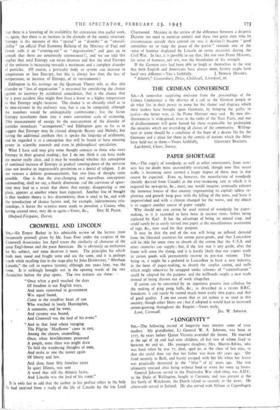PAPER SHORTAGE Sitt,—The supply of woodpulp, as well as other
constituents, from over- seas has no doubt been unavoidably restricted, though now that ocean traffic is becoming more normal a larger import of these may in due course be expected. Even so, however, the manufacture of woodpulp (mainly derived from Canada) at the ever-increasing rate at which it is required for newsprint, &c., must, one would imagine, eventually exhaust the immense forests of that country (representing its capital) unless re- planting and growth keep pace with the felling of the trees, and leave it impoverished and with a climate changed for the worse, and my object is to suggest another source of paper supply.
Why should not raw cotton be used instead of woodpulp for paper- making, as it is recorded to have been in ancient times before being replaced by flax? It has the advantage of being an annual crop, and could surely be as easily turned into paper as the miscellaneous assortment of rags, &c., now used for that purpose.
It may be that the end of the war will bring an inflated demand from the liberated countries for cotton piece-goods, and that Lancashire will be able for some time to absorb all the cotton that the U.S.A and other countries can supply ; but, if the last war is any guide, after the boom will come the slump, and it is hardly likely that our export trade in cotton goods will- permanently recover its pre-war volume. That being to, it might be a godsend to Lancashire to have a new industry, in the form of paper-making, to absorb the surplus cotton, and mills which might otherwise be scrapped under schemes of " rationalisation " could be adapted for the purpose, and the millhands taught a new trade instead of being thrown out of work altogether.
If cotton can be converted by an ingenious process into cellulose for the making of ping pong balls, &c., as described in a recent B.B.C. broadcast, it can surely be turned much More easily into paper, and that of good quality. I am not aware that as yet cotton is so used in this country, though other fibres are ; but if adopted it would lead to increased cotton-growing throughout the Empirc.—Yours truly,


























 Previous page
Previous page